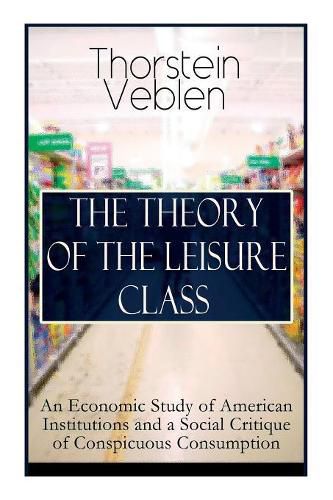Readings Newsletter
Become a Readings Member to make your shopping experience even easier.
Sign in or sign up for free!
You’re not far away from qualifying for FREE standard shipping within Australia
You’ve qualified for FREE standard shipping within Australia
The cart is loading…






This title is printed to order. This book may have been self-published. If so, we cannot guarantee the quality of the content. In the main most books will have gone through the editing process however some may not. We therefore suggest that you be aware of this before ordering this book. If in doubt check either the author or publisher’s details as we are unable to accept any returns unless they are faulty. Please contact us if you have any questions.
The Theory of the Leisure Class is criticism of capitalism. Conspicuous consumption, along with conspicuous leisure, is performed to demonstrate wealth or mark social status. The book is a treatise on economics and a detailed, social critique of conspicuous consumption, as a function of social class and of consumerism, derived from the social stratification of people and the division of labour, which are the social institutions of the feudal period (9th - 15th centuries) that have continued to the modern era. The book presents the evolutionary development of human institutions (social and economic) that shape society, such as how the citizens earn their livelihoods, wherein technology and the industrial arts are the creative forces of economic production. The sociology and economics applied by Veblen show the dynamic, intellectual influences of Charles Darwin, Karl Marx, Adam Smith, and Herbert Spencer; thus, his theories of socio-economics emphasize evolution and development as characteristics of human institutions. Thorstein Veblen (1857-1929) was an American economist and sociologist. He is well known as a witty critic of capitalism. Within the history of economic thought, Veblen is considered the leader of the institutional economics movement. Veblen’s distinction between institutions and technology is still called the Veblenian dichotomy by contemporary economists.
$9.00 standard shipping within Australia
FREE standard shipping within Australia for orders over $100.00
Express & International shipping calculated at checkout
This title is printed to order. This book may have been self-published. If so, we cannot guarantee the quality of the content. In the main most books will have gone through the editing process however some may not. We therefore suggest that you be aware of this before ordering this book. If in doubt check either the author or publisher’s details as we are unable to accept any returns unless they are faulty. Please contact us if you have any questions.
The Theory of the Leisure Class is criticism of capitalism. Conspicuous consumption, along with conspicuous leisure, is performed to demonstrate wealth or mark social status. The book is a treatise on economics and a detailed, social critique of conspicuous consumption, as a function of social class and of consumerism, derived from the social stratification of people and the division of labour, which are the social institutions of the feudal period (9th - 15th centuries) that have continued to the modern era. The book presents the evolutionary development of human institutions (social and economic) that shape society, such as how the citizens earn their livelihoods, wherein technology and the industrial arts are the creative forces of economic production. The sociology and economics applied by Veblen show the dynamic, intellectual influences of Charles Darwin, Karl Marx, Adam Smith, and Herbert Spencer; thus, his theories of socio-economics emphasize evolution and development as characteristics of human institutions. Thorstein Veblen (1857-1929) was an American economist and sociologist. He is well known as a witty critic of capitalism. Within the history of economic thought, Veblen is considered the leader of the institutional economics movement. Veblen’s distinction between institutions and technology is still called the Veblenian dichotomy by contemporary economists.